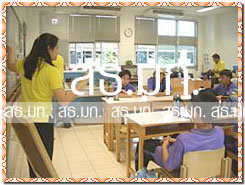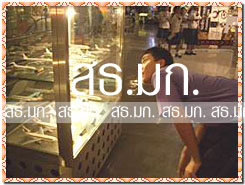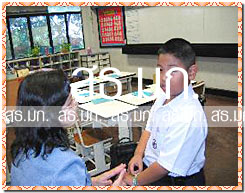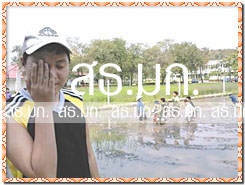 |
|
|
Science in your field: What does it look like?
* Supattra Wongvisate Andrade
* อาจารย์ประจำศูนย์วิจัยการศึกษาเพื่อเด็กที่ต้องการความช่วยเหลือพิเศษ ขณะนี้ลาศึกษาต่อระดับปริญญาเอก สาขาการศึกษาพิเศษ ณ มหาวิทยาลัยนอร์ธเทิร์นโคโรลาโด ประเทศสหรัฐอเมริกา
|
In my education field, I have demonstrated developmental teaching, adapting behavior, reducing sensory dysfunction and creating curriculum for severe students with autism for 5 years. I emphasized the potential of students with autism in learning and proven that they could be able to achieve goals through their own learning styles. My model of evidence based on education is professional wisdom and empirical evidence; both are the paramount for developing my educational field. I realized that it depends on how to apply both evidences for eligibility in each circumstance; working with the human, you could not consider only one implement. |
|
 |
When I began to work with autistic students, I had to search the information from many researchers like Scheuermann & Webber, about the autistic students characteristics, their strengths, and their dysfunctions. Thereby, the empirical evidence has been useful for initiating my knowledge about the nature and diagnosis of children with autism. In my opinion, the empirical research about the diagnoses and description of the nature of autism spectrum has been helpful and essential for the teachers learning about the autistic students world. |
|
In addition I have been using the strengths potential learning and deficit learning of students with autism for classroom management as my teaching materials focus on visual support learning. This technique would support the students with autism for visual thinking, and the research from Ph.D. Grandin, who has autism spectrum. Grandin has shown how her brain transfers from language to visual thinking, and how the words or language is very complex for her to understand the meaning of (Grandin, 2000). This empirical research could be the essential premise for guidance teaching, and I have used it for my autistics students learning. |
|
 |
However, in spite of these facts I had the encounter about the weakness of empirical research; it is not adequate enough knowledge for my education field. Working and interacting with the human behaviors are complicated to study; each autistic student is different from each other. Furthermore, the level of dysfunctions with autism spectrum impacts their abilities for process learning. For example, some the students with autism, who have very low function could not make eyes contact with people, objects, and visual materials. I had to record the observation each students behavior and his or her learning, and I provided the file for each student that includes a behavior observation record and a learning outcome record. Professional wisdom has therefore begun to reform my outstanding knowledge. My speculation into how I could make students with autism make eye contact with me when I was talking to him/her presented a specific challenge. If the student learns to focus on one thing such as my face, he or she would focus on our visual materials. I had proved my thoughts to support the students developmental learning. |
|
 |
We would then practice at the beginning of each class period. I was holding an adaptive equipment tool that produces multicolored lights and told the student look at the light. After the student looked at the light, I moved the light slowly to the left, to the right, up, down, and in front of my face. Then I would say hello and began a few conversation. This practice was about 3 minutes before beginning activities. My colleagues and I had an agreement to do the same thing every day. Consequently, the student began to look at the objects and make eye contact when someone interacts with him or her. From my observation record, it has shown the severe autistic students progress with their perception of learning social skills, and communication skills. This is one of the evidences from my professional wisdom, and I have started to do more classroom research for developing my education field. |
|
 |
Therefore, the professional wisdom is very important for the teachers; they should embrace their commonsense, thought, speculation, analyze, synthesis, and experience teaching. It could create for developing new knowledge in education areas. The empirical research would be the guidance and empirical resources should be used for supporting the background of the education the teacher could use, empirically, for predicting the future. |
|
 |
Reference |
Scheuermann, B., & Webber, J. (2002). Autism: Teaching DOES Make a Difference. Belmont: Wadsworth/ Thomson Learning. |
|
Grandin, T. (2000, June). My Experiences with Visual Thinking Sensory Problems and Communication Difficulties. [Online serial]. Available http://www.autsim.org/temple/visual.html |
|
|
|
|
 |
|











